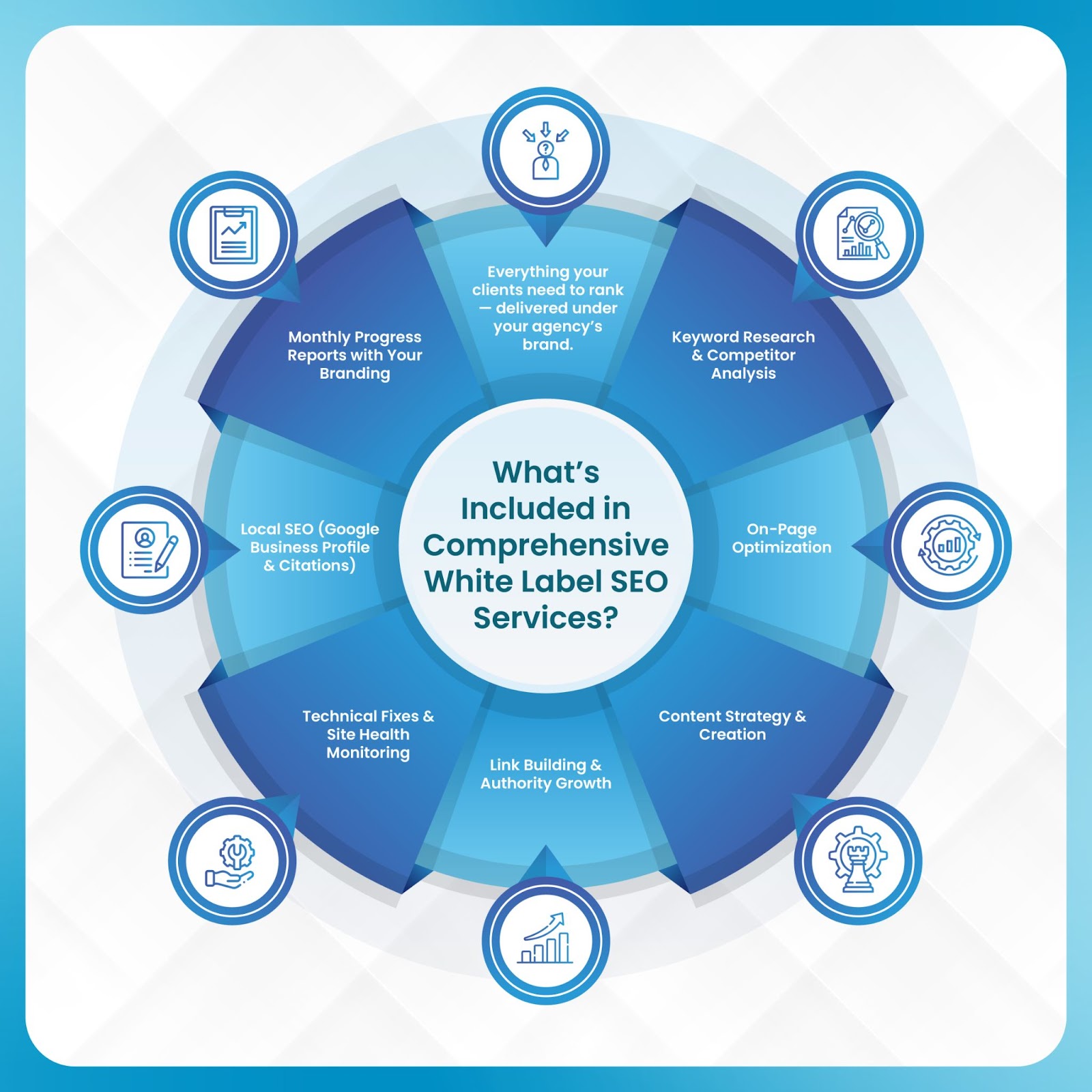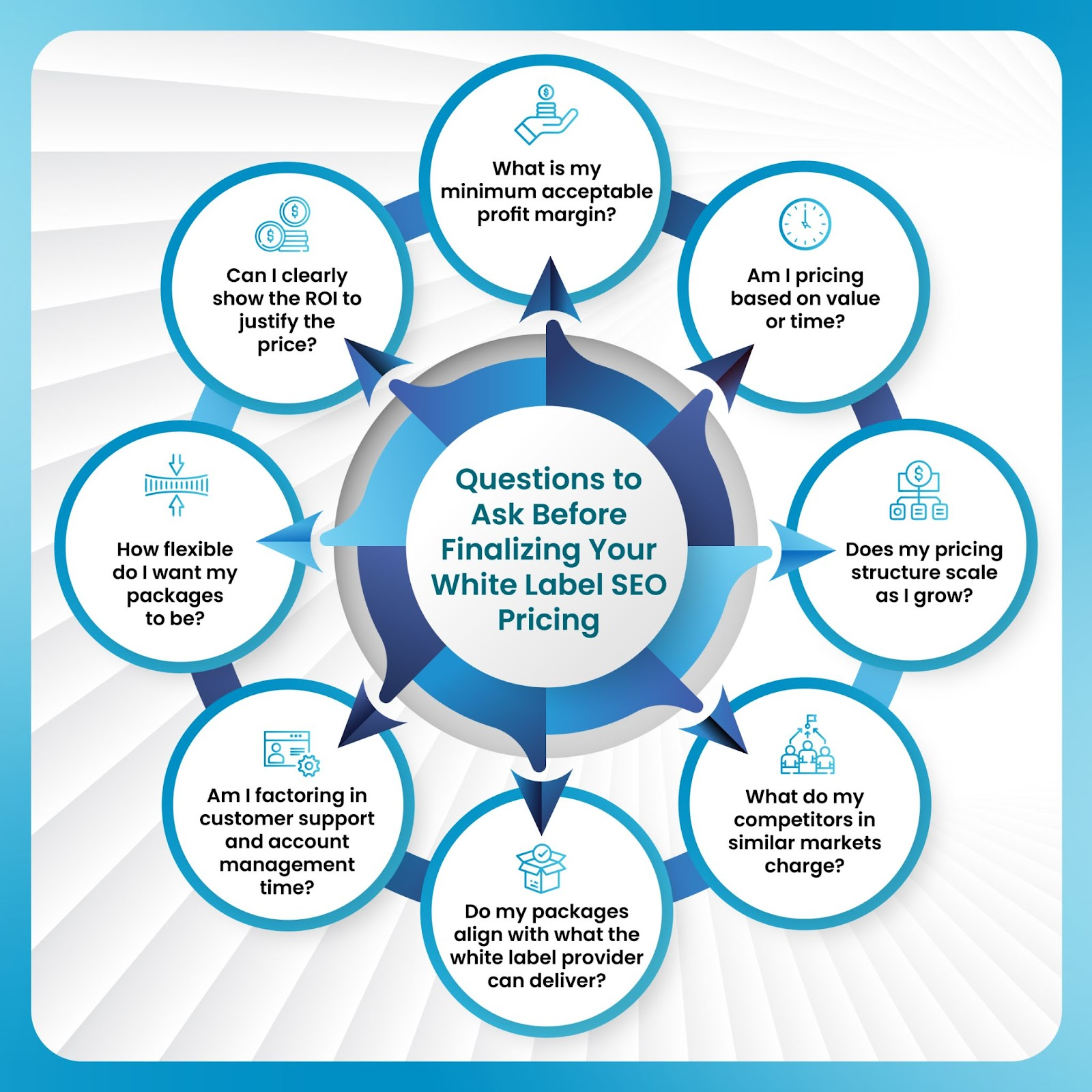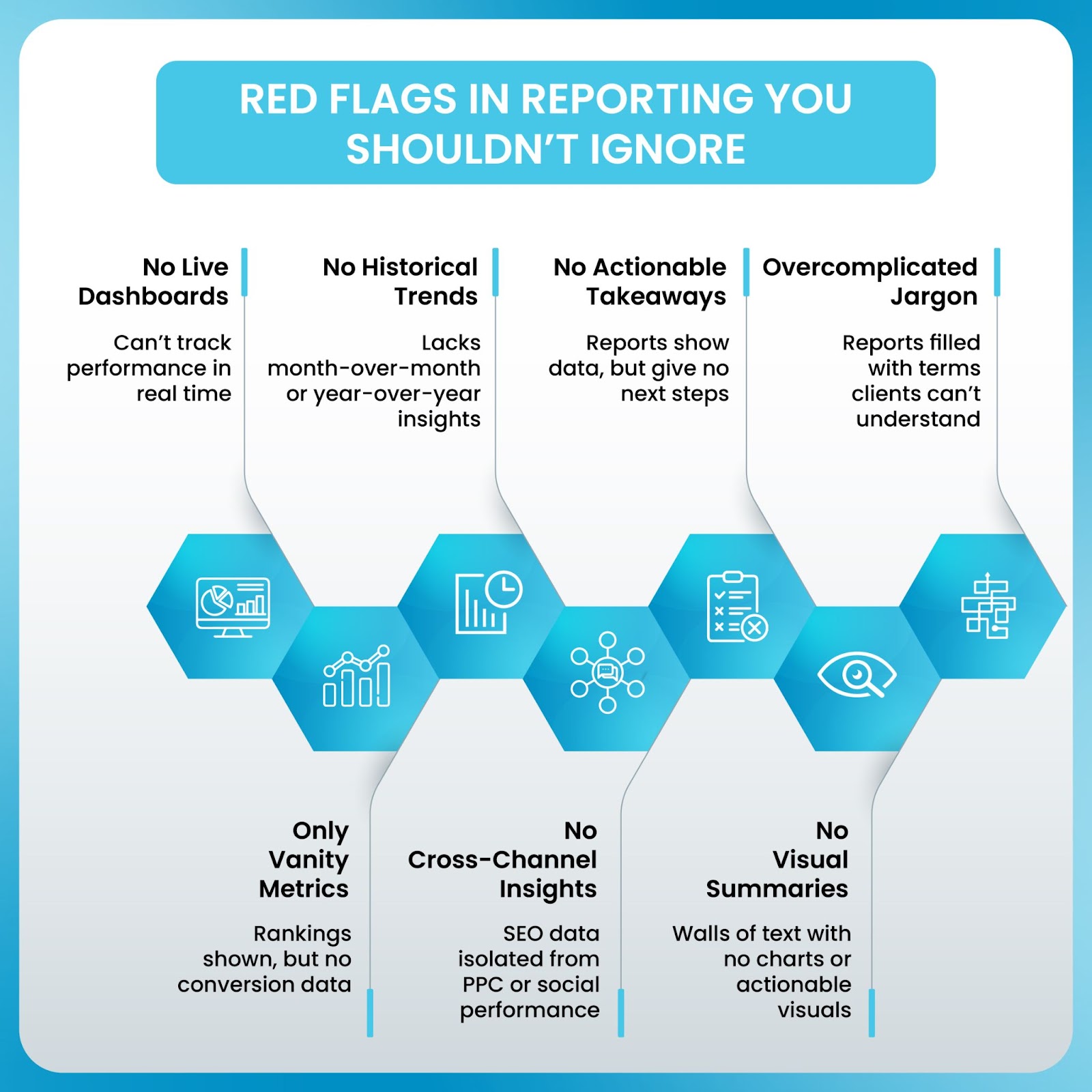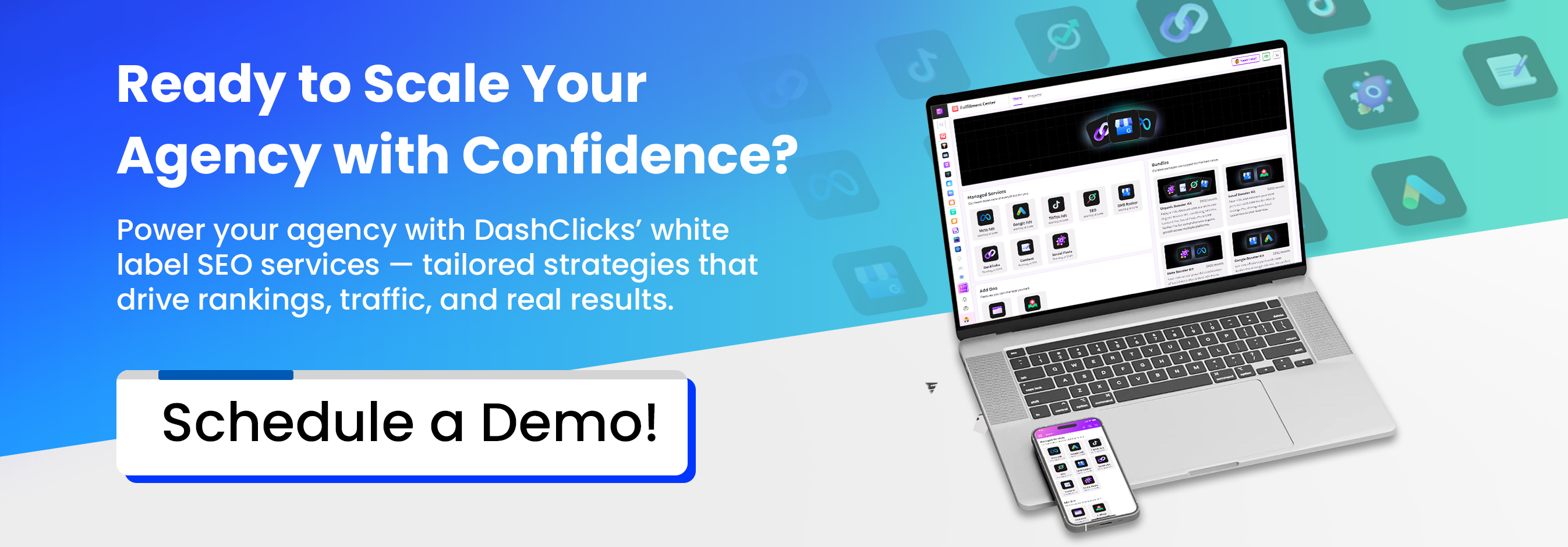Struggling to scale your digital marketing agency while keeping up with diverse client needs? You’re not alone. According to HubSpot, 63% of marketers say generating traffic and leads is their biggest challenge. Meanwhile, industry benchmarks show that around one-third to half of marketing agencies struggle with client acquisition and scaling growth effectively.
For many agencies and small businesses, white label SEO programs offer a powerful solution—providing expert SEO services without the overhead of an in-house team. The global SEO services market is projected to reach $171.77 billion by 2030, with white label partnerships driving a significant portion of that growth.
This comprehensive guide is built for agencies and small businesses looking to scale sustainably through the right SEO reseller partner. Whether you're aiming to improve scalability, reduce operational costs, or deliver high-quality results, choosing the right provider is key to your long-term success.
We’ll explore 13 essential factors you should consider when vetting a white label SEO partner—covering how each one impacts your agency’s scalability, reputation, and client satisfaction.
1. Track Record and Reputation
Your agency’s reputation is only as strong as the partner delivering your services. When evaluating a white label SEO provider, their track record essentially becomes your own. A partner with a proven history of delivering results reduces the risk of client dissatisfaction and builds long-term trust.
Start by reviewing their portfolio and client testimonials. Focus on outcomes backed by data rather than vague claims like “increased traffic.” According to BrightLocal, 87% of consumers read online reviews for local businesses, so third-party validation is crucial.
Use platforms like Clutch, Trustpilot, and Google Reviews to verify credibility. Pay attention to how they respond to negative feedback—it reveals their attitude toward service quality and accountability.
A trustworthy white label SEO company should offer:
- At least 3–5 years of experience in the industry
- Documented case studies with measurable results
- Client retention rates above 85%
- Positive reviews across multiple platforms
- Industry certifications and partnerships with major tools and platforms
2. SEO Expertise and Available Services
The depth and range of your partner’s SEO services will directly impact your ability to serve a wide variety of clients. A comprehensive SEO reseller program should cover the full spectrum of modern optimization practices.
Essential services should include keyword research and strategy, on-page optimization, technical SEO audits, content creation and optimization, link-building campaigns, local SEO for businesses with physical locations, and e-commerce SEO for online retailers. Advanced services might cover voice search optimization, mobile-first indexing strategies, and Core Web Vitals optimization.

According to Backlinko, businesses that blog receive 97% more links to their website, highlighting the importance of content-focused SEO strategies. Your white label SEO partner should demonstrate expertise across these areas and show evidence of staying current with algorithm updates and industry best practices.
Look for providers who offer specialized expertise in your target industries. A partner experienced in healthcare SEO will understand HIPAA compliance requirements, while one familiar with e-commerce can navigate product schema markup and conversion optimization.
3. Scalability
Your white label SEO partner must accommodate fluctuations in demand as your agency grows. Research by the Small Business Administration shows that only 50% of businesses survive past five years, often due to scalability challenges.
Effective scalability means your partner can handle sudden increases in client volume without compromising service quality. They should offer flexible packages and service tiers that allow you to start small and expand as needed. This includes the ability to add or remove services, adjust campaign budgets, and modify reporting frequency based on client requirements.
Key scalability indicators include:
- Flexible contract terms that don't lock you into rigid structures
- Tiered pricing models that reduce per-client costs as volume increases
- Dedicated account management that scales with your business
- Technology infrastructure capable of handling growth
- Clear processes for onboarding new clients quickly
Ask about their current capacity. A partner already operating near full capacity may struggle to accommodate your expansion plans.
4. Pricing Transparency
Hidden fees can damage client trust and cut into your profits. According to PwC, 73% of consumers view pricing as a major factor in decision-making. Transparent, predictable pricing is essential.
Understand all upfront costs, including setup fees, monthly service charges, and any additional costs for extra services or revisions. Compare different pricing models to find the best fit for your business structure.
Common pricing models include:
- Flat Rate: Fixed monthly cost regardless of hours worked
- Pay-as-you-go: Charges based on actual services delivered
- Project-based: Set price for specific deliverables
- Tiered Packages: Different service levels at various price points

Request detailed service-level agreements (SLAs) that outline what's included in each package, response times for different types of requests, and penalties for missed deadlines. This documentation protects both parties and sets clear expectations.
Be wary of providers offering significantly below-market pricing, as this often indicates shortcuts in service quality or hidden costs that emerge later.
5. Communication and Support
Poor communication can jeopardize client relationships and delay critical projects. According to the Project Management Institute, ineffective communication is the primary cause in roughly one-third of project failures.
Your white label SEO partner should provide dedicated account management with consistent points of contact. Look for providers offering multiple communication channels, including phone, email, chat, and project management platforms.
Essential communication features include:
- Designated account managers familiar with your business
- Regular progress updates and status calls
- 24/7 support for urgent issues
- Clear escalation procedures for problem resolution
- Proactive communication about industry changes or opportunities
Evaluate their response times during the vetting process. If they're slow to respond to sales inquiries, they'll likely be slow to respond to service requests. The best partners provide same-day responses to non-urgent matters and immediate attention to critical issues.
6. Customization and Branding Options
Seamless brand integration is crucial for maintaining client trust and agency credibility. Your white label SEO partner should offer comprehensive branding options that make their services appear as natural extensions of your agency.
Look for providers offering fully branded dashboards that display your logo, colors, and messaging. Client-facing reports should be customizable with your branding elements and formatted according to your standards. The client interface should integrate smoothly with your existing tools and maintain consistent brand identity throughout all touchpoints.
Advanced branding options include:
- Custom domain names for client portals
- Branded email communications
- Your agency's contact information on all deliverables
- Customizable report templates and layouts
- Integration with your existing CRM and project management systems
7. Compliance and Ethical SEO Practices
Working with agencies that follow ethical SEO practices protects both your reputation and your clients' websites from search engine penalties. Google processes over 8.5 billion searches per day, and its algorithms are increasingly sophisticated at detecting manipulative tactics.
White-hat SEO practices focus on creating valuable content, earning legitimate backlinks, and improving user experience. These sustainable approaches build long-term search visibility rather than quick fixes that can result in penalties.
Dangerous black-hat tactics to avoid include:
- Link farming and private blog networks
- Keyword stuffing and content spinning
- Cloaking and doorway pages
- Negative SEO attacks on competitors
- Schema markup manipulation
Verify that your potential partner follows Google's Webmaster Guidelines and stays current with algorithm updates. They should be able to explain their methodologies and provide transparency about their link-building sources and content creation processes.
8. Reporting and Analytics Capabilities
Transparent reporting builds client trust and demonstrates the value of your SEO investments. Modern businesses expect real-time access to their marketing data, with 89% of marketers reporting that data-driven insights improve their campaign performance.
Your white label SEO partner should provide comprehensive reporting that includes keyword rankings and movement, organic traffic growth and sources, conversion tracking and goal completions, backlink acquisition and quality metrics, technical SEO issue identification and resolution, and competitor analysis and market positioning.

The best reporting platforms offer both automated periodic reports and real-time dashboards that clients can access independently. This transparency reduces the time you spend answering client questions about campaign progress and builds confidence in your services.
Ensure reports are easily understandable for non-technical clients while providing enough detail for informed decision-making. Look for providers who can customize reporting frequency and format based on client preferences.
9. Data Security and Confidentiality
Safeguarding client data is critical when outsourcing SEO work, especially given that 43% of cyber attacks target small businesses. Your white label SEO partner will likely need access to sensitive information, including website analytics, search console data, social media accounts, and sometimes even customer databases.
Essential security measures include:
- Comprehensive non-disclosure agreements (NDAs)
- Data encryption in transit and at rest
- Regular security audits and certifications
- Limited access protocols with role-based permissions
- Secure file sharing and communication platforms
- Clear data retention and deletion policies
Ask about their cybersecurity certifications, employee background checks, and incident response procedures. A security breach involving client data could devastate your agency's reputation and result in legal liability.
10. Client Access and Dashboard Simplicity
User-friendly client dashboards improve satisfaction and reduce support requests. The ideal client portal should provide intuitive navigation that doesn't require training, real-time access to key performance metrics, mobile-responsive design for on-the-go access, role-based permissions for different user types, and integration with popular business tools.
Test the dashboard yourself during the evaluation process. If you find it confusing or difficult to navigate, your clients will too. The best platforms offer demo accounts that let you experience the full functionality before committing.
Consider how the dashboard handles different client sophistication levels. Some clients want high-level summaries, while others prefer detailed technical data. Your white label SEO comapny should accommodate both preferences.
11. Case Studies of Real Success
Concrete examples of past successes provide insight into what your white label SEO partner can achieve for your clients. According to the Content Marketing Institute, case studies are one of the most effective form of content marketing for B2B companies.
Quality case studies should include specific industry contexts that match your target clients, measurable results with before-and-after metrics, timeframes for achieving results, challenges overcome during the campaign, and strategies and tactics employed.
Look for case studies spanning different industries and business sizes. A provider with success stories only from large enterprises may not understand the unique challenges facing small businesses.
Pay attention to the metrics emphasized in case studies. Providers focusing solely on traffic increases without mentioning conversions or revenue impact may not understand business outcomes.
12. Adaptability to Market Trends
SEO evolves rapidly, with Google making hundreds of algorithm updates annually. Your white label SEO partner must stay current with industry changes and adapt strategies accordingly.
Current trends shaping SEO include E-E-A-T (Experience, Expertise, Authoritativeness, Trustworthiness), visual and voice search optimization, AI-powered content and tools, Core Web Vitals and page experience signals, and mobile-first indexing requirements.
According to Google, 50% of consumers who conducted a local search on their smartphone visited a store within a day, highlighting the importance of staying current with mobile and local search trends.
Evaluate how quickly your potential partner adopted recent changes like the helpful content update or product review guidelines. Providers who are slow to adapt may leave your clients behind competitors who embrace new opportunities.
13. Partnership Flexibility
Low-risk partnership options allow you to test fit before making long-term commitments. According to Harvard Business Review, 60-70% of business partnerships fail, often due to misaligned expectations or rigid contract terms.
Look for providers offering trial periods or pilot programs, month-to-month contract options alongside longer-term agreements, the ability to modify services as needs change, clear exit clauses without excessive penalties, and scalable pricing that adjusts with your business growth.
Flexibility also extends to service delivery. Your needs may change as you gain experience with white label SEO or as your client base evolves. The best partners accommodate these changes without forcing you into entirely new agreements.
Consider providers who offer multiple engagement models, from full-service management to a la carte offerings that let you pick specific services as needed.
Further Reading: White Label Services: Maximizing Agency GROWTH Through Partnership
DashClicks – A Leading White Label SEO Provider
If you're looking for a white label SEO partner with both breadth and depth in services, DashClicks is a standout provider trusted by thousands of marketing agencies worldwide.
They offer white label SEO services designed for scale, results, and agency branding. Their SEO services are divided into structured phases—ensuring transparency, strategic planning, and measurable performance at every step.
An Overview of What Makes DashClicks’ SEO Program Exceptional:
A. In-Depth Keyword Research & Strategy Development
DashClicks begins every campaign with thorough keyword research based on the client’s niche, goals, and competition. They use advanced tools and real-time data to identify high-value keywords that align with both traffic opportunities and buyer intent. Their keyword strategy includes:
- Focus keyword mapping to each page
- Long-tail keyword inclusion for organic growth
- Geo-targeted keywords for local SEO clients
- Competitor keyword gap analysis
B. On-Page & Technical SEO
Their team optimizes each page based on modern SEO best practices. This includes:
- Title tag and meta description optimization
- Header tags (H1-H6) structuring
- Internal linking for site architecture
- Mobile responsiveness
- Schema markup implementation
- Image optimization and alt-text
- Fixing crawl issues, broken links, and duplicate content
They also conduct in-depth technical SEO audits and implement improvements like boosting site speed, ensuring secure protocols (HTTPS), and correcting indexing problems—vital for long-term search performance.
C. High-Quality Content Creation
Content plays a pivotal role in SEO, and DashClicks delivers on this with SEO-friendly content designed for both users and search engines. Their writers create:
- Optimized website pages
- Blog posts and supporting content
- Geo-targeted location pages
- Service pages based on keyword clusters
- Niche content aligned with each client’s tone and branding
Their writing team ensures every piece is crafted for relevance, quality, and engagement—critical for building E-E-A-T (Experience, Expertise, Authoritativeness, and Trustworthiness).
D. Link-Building & Off-Page SEO
Backlinks are one of the most important ranking factors, and DashClicks executes a clean, ethical link-building strategy that focuses on:
- Acquiring backlinks from high-authority domains
- Avoiding link schemes or low-quality sources
- Diversified anchor text strategies
- Brand mentions and citations for local SEO
They also handle directory submissions and reputation management for small businesses that rely on visibility in local search results.
E. Transparent Reporting & Real-Time Dashboards
DashClicks provides agencies and clients with real-time reporting dashboards that are fully white-labeled. You can track:
- Keyword rankings and SERP movement
- Organic traffic growth
- Click-through rates (CTR) and conversions
- Backlink metrics
- Completed deliverables and campaign progress
The dashboard is intuitive, mobile-friendly, and customizable—allowing agencies to present live SEO data under their own brand. Whether you’re an agency new to outsourcing or you're looking to expand your current offerings, DashClicks offers a robust, transparent, and results-driven white label SEO services that scales with your growth.
Key Takeaways for Your Agency's Success
Choosing the right white label SEO partner isn't just a vendor decision—it's a strategic move that will define your agency's growth trajectory and service capabilities. The 13 factors we've covered provide a comprehensive framework for evaluation, but remember that the best partner for your agency depends on your specific needs, client base, and growth objectives.
By thoroughly evaluating track record and reputation, service expertise, scalability options, pricing transparency, communication standards, branding capabilities, reporting features, ethical practices, security measures, user experience, proven results, market adaptability, and partnership flexibility, you'll position your agency for sustainable growth and client satisfaction.
The most successful agency partnerships are built on shared values, complementary strengths, and mutual commitment to client success. Take time to find a partner who aligns with your agency's mission and can grow alongside your business.
Start by shortlisting potential white label SEO companies that meet your criteria using this guide. Request demos or introductory calls to better understand their deliverables and support infrastructure. The right partnership can unlock new possibilities for your business and provide the foundation for long-term success in the competitive digital marketing landscape.



.svg)

.svg)
.svg)
.svg)
.svg)
.svg)

.svg)




.svg)
.svg)
.svg)
.svg)
.svg)